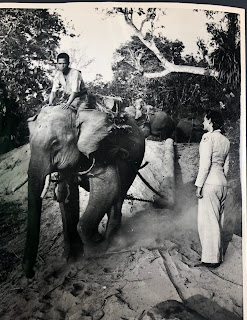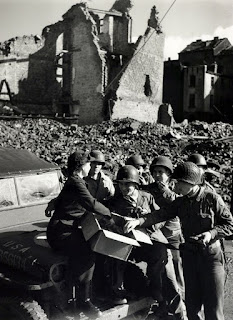This post was first published on October 13, 2020. WW2 Romance Author Eleri Grace can be counted on to write thrilling romantic stories that immerse her readers in the realities of llfe during WW2.
By Eleri Grace
I too don’t write horror, suspense,
paranormal or another genre that might have a classic “scary scene.” I write WWII
historical novels – what’s scary about that?
Well, more than might be readily
apparent. As Judith noted, real life presents plenty of scary situations, and
war certainly amplifies dangerous situations.
One of the scariest scenes I’ve
written tracks along with what is a fairly common nightmare for many people. How many
times have you jerked awake, heart pounding, with the sense that you are free
falling? Probably at least a few times in your life, I would wager.
Fairly early in my drafting process
for my debut novel, I realized that my hero Jack Nielsen was afraid of heights.
A common fear, sure, but Jack is a pilot.
How can a pilot cope with a fear of heights? It seems counter-intuitive, and I
was initially intrigued with whether that was too outlandish. So I googled
“pilots fear of heights,” and it turns out that research shows that acrophobia
is markedly, dramatically higher in the pilot population than among non-pilots.
Some studies indicate up to 90% of pilots have a fear of heights. So I asked my
teenage son, an avid flight simulator who wants to be a pilot and spends quite
a bit of time with like-minded young adults: “Yes,” he nodded. “Most of us are
afraid of heights.” It turns out that, as my son indicated, most pilots feel
very in control in the cockpit, thus keeping their natural acrophobia at bay.
But in combat? No, in combat, a
pilot faces far more threats than usual to his or her ability to feel – and be
-- in control of the plane. And that was the stuff of nightmares – both for
Jack and for ME.
I read so many non-fiction accounts
of WW2 bailout scenes that I woke up with that free fall sensation far more in
that one year than at any other time in my life. But I knew that Jack would
have to jump eventually, and I forced myself to write it, knowing his experience might yank
me from sleep for many months or years to come.
“No more time! Out!” Hank pushed him
closer to the hatch.
Jack froze. His stomach lurched and
dropped to his ankles, and his heart thrumped in his throat like a staccato
fusillade of artillery. He swayed and gripped a handle on the hatch door with
his good hand. “Go ahead,” he yelled.
Hank shook his head violently. “You
gotta jump!” he screamed in Jack’s ear.
Waves of dizziness roiled him. Jack’s
legs were as numb as his injured hand. No. No way. There was absolutely no way
he could jump out into the clouds.
Hank pried at Jack’s fingers, locked
around the hatch handle in a death grip. “Damn it, let go!” He pulled hard on
Jack’s waist, and they stumbled back to the narrow catwalk of the bomb bay.
Before Jack could clamp his hand around
the handle again, Hank put the chute rip cord into Jack’s uninjured hand and
closed his fingers around it. Then he shoved hard with both hands in the middle
of Jack’s back.
Jack was out, free-falling in the icy
slipstream, tumbling end over end. Out of control, exactly as he had always
dreaded in his imagination.
The ground rushed toward him. Slow
down, slow down, slow down!
The ring. The ripcord D-ring. Hank had
put it in his hand. Jack jerked his hand downward.
The parachute burst out of the chest
pack and opened above him with a resounding crack. His body jerked upward.
A loud, sustained bang sounded behind
him. Jack turned his head, horrified to see his trusty, much-loved ship
exploding in mid-air, engulfed in fiery flames.
Being the hero, Jack does land safely. But does he connect up with Allied troops or the German forces who imprison him in a wretched POW camp? Does he encounter German civilians who might decide to exact vigilante justice against him as another terror flieger?
You can read more of his experiences
and his love story with Red Cross Girl Vivian in my debut novel, Courage to be Counted.
As the bombs fall on Europe, their love affair must survive
a deadly war…
Vivian Lambert wants to do her part. When she
wins a coveted overseas post with the Red Cross, she focuses on her war
service. Falling hard for a sexy pilot wasn't part of her plan.
Jack Nielsen has a mission. Motivated by
patriotic duty and desire to avenge the death of his best friend, Jack commands
a ten-man B-17 crew. Keeping himself and his men alive in the fire-filled skies
over Europe will require Jack's full focus. Romancing a headstrong Red Cross
Girl is a distraction he knows he shouldn't indulge.
While Vivian's work takes her across France
and into the heart of Nazi Germany, mounting casualties drive Jack to confront
his dwindling odds of survival. As Allied forces converge on all fronts, can
Vivian and Jack's relationship withstand an excruciating battle between love
and duty?
Courage to be Counted is the first book in the Clubmobile Girls series of
sizzling hot historical romances. If you like brave military heroes,
trailblazing heroines, and romance under fire, then you'll love Eleri Grace's
page-turning tale.
Learn
more about me and my writing on my website, and you can also find me on Facebook, Twitter, Pinterest, and Instagram.
















.jpeg)




































